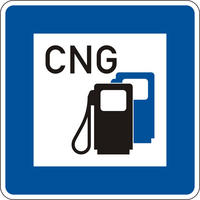An Introduction to Automotive CNG (Compressed Natural Gas)
 |
Provided by CNGPrices.com
What is CNG?
CNG stands for Compressed Natural Gas. It is the same stuff that is piped into most homes in the United States, and it may already be what you use for cooking on your stove and for heating your house. Where do we get CNG?
Just like oil, CNG is drilled out of the ground. In fact, many of the same wells that have oil also have a lot of compressed natural gas. The advantage to extracting the natural gas is that it is easier because it is a gas - there is less processing required to get it out of the ground. However, this also makes it a bit more difficult to transport. As a gas, you can't just put it into a 55 gallon drum and ship it across the world. There are two main options for shipping natural gas - in a pipeline or by compressing it first into compressed natural gas (CNG) or liquefied natural gas (LNG).
However, whenever you compress anything there are many safety measures that are needed to make sure that there won't be any accidents. So the tanks that are used to transport natural gas are much stronger, and therefore much heavier than those used to transport gasoline and oil. Is CNG safe?
Many people are worried about the safety of CNG. There have been several high-profile accidents that have happened where CNG tanks have exploded and this rightfully causes some people to be a bit anxious about CNG.
The truth is that CNG is extremely safe when handled properly. It is actually less explosive than gasoline, and harder to ignite. It also has the advantage that if there is an accident with CNG, when it escapes from its container, it literally floats away, unlike gasoline which leaves a flammable puddle and explosive fumes that are heavier than air, so they stick to the ground. Almost all of the accidents that have occurred in the past with CNG have been due to people who do not follow standard safety procedures - these procedures are very, very easy to follow, but there are always some people out there trying to save a buck who don't do what they are supposed to do. As far as I know, there has never been a major accident in the USA involving a CNG system that was properly installed and cared for. What kind of mileage does a CNG car get?
A very important question that many people ask is how much it will cost to operate a CNG vehicle. Luckily, CNG is priced in a unit that is called a "gasoline gallon equivalent", or GGE. Cars get the same mileage on 1 GGE as they do on 1 gallon of gasoline. All of the prices for the USA on this site are in GGE, and that means that you can fill a car that is running on CNG for the equivalent of as little as $0.87 per gallon in Utah and get the same mileage as someone driving the same car running on gasoline, when they are filling their car for three or four dollars a gallon.
As an example, Honda makes a natural gas Civic. I own a 2002 model year Civic and I get about 30 miles to the GGE in the city and about 36-40 miles to the GGE on the highway. This is exactly the same as the gasoline version of the car gets. So when you look at prices on this site (at least prices in the USA), you can compare them directly to the price of gasoline down the street. How much CNG does the USA have?
Many people are interested to know how much CNG is available in the US, so we can "reduce our dependence on foreign oil". The answer is complicated, and depends on who you believe. According to the CEO of Chesapeake Energy, a major CNG producer in the United States, there is enough domestic CNG to meet our needs for the next 100 years based on estimated demand.


